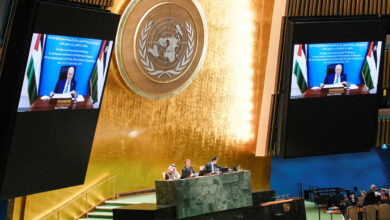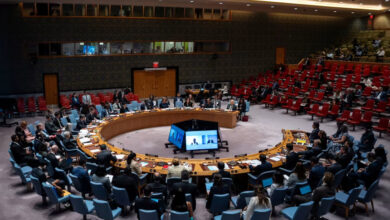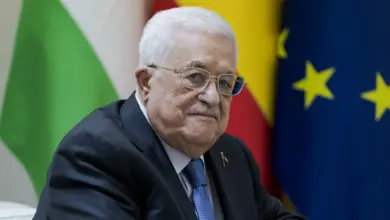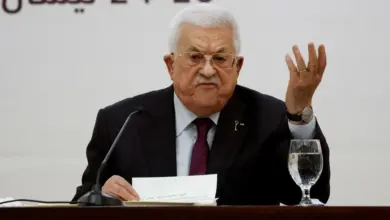Both state-run and independent papers lead today with news about the 2011 presidential election. Al-Ahram, Al-Akhbar and Al-Gomhurriya focus on incumbent President Hosni Mubarak, while for the rest focus on Mohamed ElBaradei.
The pro-government papers are mirror images of each other on their front pages above the fold, with a reminder of Egypt’s football friendly against England in London tonight occupying the left side of the page and President Mubarak’s meeting with Palestinian National Authority President Mahmoud Abbas taking center stage.
The two leaders met yesterday in Sharm el-Sheikh to review the latest developments. They discussed Egypt’s “vigorous efforts” to unite Palestinian factions, according to the papers. They also discussed efforts to create an “atmosphere” that would help resume Israeli-Palestinian negotiations.
Al-Ahram, Al-Akhbar and Al-Gomhurriya’s coverage of the summit are nearly identical, with word-for-word repetitions of phrases like “Egypt’s vigorous efforts” and “creating an atmosphere”.
Abbas is quoted by the papers as saying after the meeting, “When we come to Egypt, we are eager to listen to the opinion of the Egyptian leadership, whose position we appreciate.” Abbas also asked for Arabs to unite in facing Israel’s continued settlement policies. Al-Ahram also features a small item on Egypt’s condemnation of Israel’s building 600 new residential units in Jerusalem.
When it comes to the upcoming football match, Al-Ahram states that the event “ensured [Egypt’s] position amongst the adults [of football]." Al-Gomhurriya assures its readers that Gamal and Alaa Mubarak called to check in on the Egyptian team 24 hours before the match.
Also notable in Al-Ahram is a curiously random caricature with a drawing of a man with a noose around his neck, contemplating suicide. His wife is censuring him: “If you carry out this ‘suicidal operation’ you will be considered a terrorist in the eyes of the US and there will be a call for your arrest, dead or alive.”
Al-Gomhurriya’s chief editor, Mohamed Ali Ibrahim, writes a column in his paper today titled “Why hasn’t the US constitution changed despite its shortcomings?” The editorial is a peculiar attempt to dissuade readers from amending Egypt’s Constitution.
Though Ibrahim makes no mention of ElBaradei, he does question the recent explosion of demands to amend Egypt’s Constitution, particularly by dropping Articles 76, 77 and 88, amendments that appear to have been put in place to discourage new candidates from running for office.
Yet Ibrahim, calling attention to the US constitution, goes on to point out that despite its shortcomings and the–often unfair–complexities of its indirect electoral system, no American wants to change it. Ibrahim adds that the US constitution was only amended 12 times since the first US president. (In reality it was amended 27 times.) Nevertheless, Ibrahim seems to ask: why are people here so eager to change the constitution while in some of the oldest democracies they hardly ever do that?
Al-Wafd leads with foreign media coverage on ElBaradei, and it seems the signs for him are not good. The daily quotes an article published in Newsweek that propagates the view that rather than unifying the opposition, ElBaradei may make things worse. According to the Al-Wafd report, the author of the Newsweek article believes that ElBaradei won’t stand a chance at the polls, and suggests that he should remain out of the election in order not to disempower the opposition.
Al-Shorouq also leads with foreign media coverage on ElBaradei, and highlights an article in the American magazine Foreign Policy, also noted in Al-Wafd. The independent daily quotes the article as saying “ElBaradei is on a difficult political mission,” and questions whether he will succeed in making the necessary changes to the constitution, which he has set as preconditions for running in the general election.
Al-Shorouq also covers demonstrations yesterday in front of Cairo University, where students and professors protested Israel’s inclusion of two West Bank holy sites on its national heritage list, as well as the recent clashes in Al-Aqsa mosque. Israeli flags were burned amid a heavy security presence. Similar demonstrations were also reported in front of Al-Azhar, Ain Shams and Kafr el-Sheikh University.
The independent Al-Dostour leads its Wednesday special edition in large red font: “The Decision to arrest ElBaradei.” Al-Dostour quotes Gehad Auda, a prominent figure in the ruling National Democratic Party’s Policies Secretariat as saying, “ElBaradei is not beyond arrest because he isn’t immune against the law-–ask Ayman Nour.”
The paper also notes an article in the New York Times, which Al-Dostour wrongly reports as saying that the overwhelming appearance of ElBaradei on the political scene may mean that President Hosni Mubarak will not nominate himself for the 2011 elections. Al-Dostour writes that the article suggests that, in reality, it is Gamal Mubarak who may be up for this round–although the article in the New York Times actually puts forward the reverse scenario.
Egypt’s newspapers:
Al-Ahram: Daily, state-run, largest distribution in Egypt
Al-Akhbar: Daily, state-run, second to Al-Ahram in institutional size
Al-Gomhorriya: Daily, state-run
Rose el-Youssef: Daily, state-run, close to the National Democratic Party’s Policies Secretariat
Al-Dostour: Daily, privately owned
Al-Shorouq: Daily, privately owned
Al-Wafd: Daily, published by the liberal Wafd Party
Al-Arabi: Weekly, published by the Arab Nasserist party
Youm7: Weekly, privately owned
Sawt el-Umma: Weekly, privately owned




